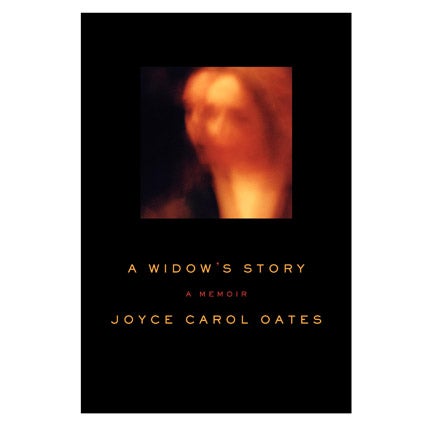A Widow's Story: A Memoir, By Joyce Carol Oates
It is difficult to open novelist Joyce Carol Oates's powerful and revealing chronicle of her widowhood without crying

Perhaps the detail that will most surprise readers of Joyce Carol Oates's memoir is that "JCO", the Great American Novelist and author of over a hundred books, is herself a fiction.
Although Joyce Carol Oates is the name on the cover, this book is written by Joyce Smith, the adoring wife and devastated widow of her life partner and literary collaborator, Raymond Smith.
Although she was unable to write fiction after he died, inhabiting "Joyce Carol Oates" in her teaching role and on the book festival circuit gave her a handy container for the pieces that remained of the shattered Joyce Smith. "Being an 'established writer' – even a 'major American writer'... doesn't bring with it confidence, security, or even a sense of who/whom one is", she writes.
After 47 years of devoted marriage, Raymond Smith died in February 2008 from a secondary infection that he picked up while being treated in hospital for pneumonia. He had been recovering, supposedly, and the first chapters of this heart-wrenching memoir focus on Mrs Smith's guilt and disbelief after she reached his hospital bed just too late. "Ray is still alive," she had been told in a midnight phonecall. "Such pathos in still, so provisional and desperate."
This is the first memoir that Oates/Smith has written, and it is quite different from the tight, edited, confident style of her fiction. Here, there are repetitions of words and ideas, and disjointed sentences tumbled together with dashes and commas in a breathless, tachycardic rush on the page.
Every widow is, to some extent, a broken Lear, raving on the heath, she writes. "Except unlike King Lear on the heath, one lacks the Shakespearian touch." I disagree: Oates's writing is so incisive, so beautifully revealing of what it means to "inhabit a free-fall world from which meaning has been drained", that it is difficult to open this book without crying.
The book was initially intended as an advice manual for widows, cobbled together from the author's contemporary journals. It has turned into something much more personal. She advises widows, "Do not think that grief is pure, solemn, austere and 'elevated' – this is not Mozart's Requiem Mass ... Think of crude gravel that hurts to walk on. Think of splotched mirrors in public lavatories. Think of towel dispensers when they have broken and there is nothing to wipe your hands on except already-used badly soiled towels," and she is harrowing on the measly bathos of grief: "Where grief couldn't provoke me to tears, cat pee on [Ray's death certificate] does." Crippling insomnia is the torment of the widow; the possibility of suicide her only reassurance.
Her writing is, also, disarmingly funny. Shortly after Ray's death, her house (no longer her "home") is besieged by "Deluxe Sympathy Baskets" from well-meaning friends. (Yes, such crassness does exist, it costs $115 and includes "a hearty sausage".) She asks: "Why are people sending me these things? Do they imagine that grief will be assuaged by chocolate-covered truffles, pâté de foie gras, pepperoni sausages?"
As well as the "crude cruel stupid well-intentioned", the widow is fortunate to have some good friends, whose kind words and wise counsel she includes, along with her own email responses.
To the writer Edmund White she writes: "These days just go on, on and on without end like that play of Sartre's in which individuals' eyelids have been removed." Towards the end of the book, she points out: "As these email excerpts suggest, the memoir is a memoir of loss and grief but also perhaps more significantly a memoir of friendship."
This does raise the question: why has she written such a book? She admits: "I am no longer convinced there is any inherent value in grief; or, if there is, if wisdom springs from the experience of terrible loss, it's a wisdom one might do without." The writing of it doesn't seem to have given her much comfort, and the vicious reviews of it in certain American papers can only have reopened a mortal wound. (The New York Times reviewer suggested that her remarriage, 13 months after Ray's death, makes a lie of this memoir. It doesn't; it simply has no relevance to it.) Certainly, a memoir so eloquent and raw as this can only make a reader aware of two things: 1) Bereavement is devastating, indescribable and impossible to bear; and 2) It will happen to us all.
In an epilogue, entitled "Three small sightings in August", Oates/Smith describes two, seemingly irrelevant events: meeting a man at a dinner party with friends; and finding a pair of lost earrings in the knocked over bins. She writes: "If I have lost the meaning of my life, and the love of my life, I might still find small treasured things amid the spilled and pilfered trash."
This memoir, and its author's continuing life, are beautiful tributes to Raymond Smith.
To order any of these books at a reduced price, including free UK p&p, call Independent Books Direct on 08700 798 897 or visit independentbooksdirect.co.uk
Subscribe to Independent Premium to bookmark this article
Want to bookmark your favourite articles and stories to read or reference later? Start your Independent Premium subscription today.

Join our commenting forum
Join thought-provoking conversations, follow other Independent readers and see their replies